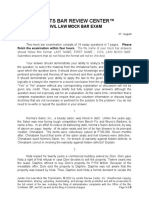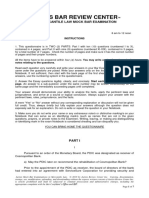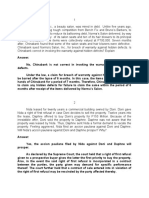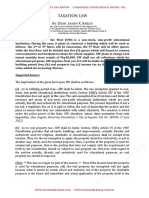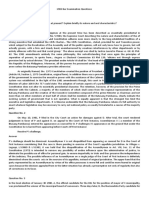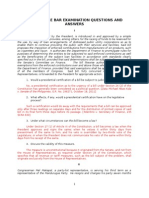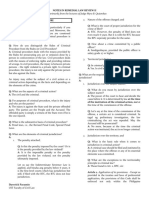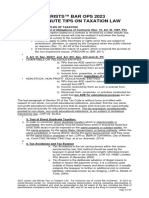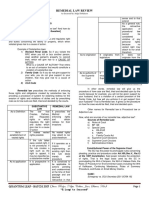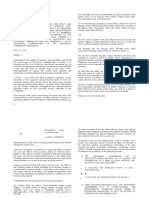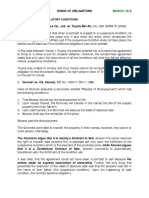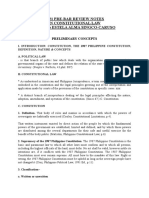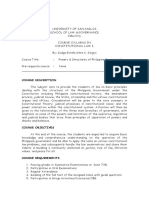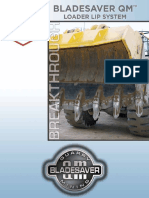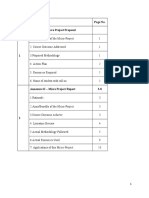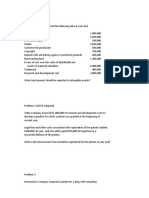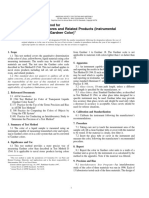JURISTS BAR REVIEW CENTER™
SUGGESTED ANSWERS TO 2022
COMMERCIAL LAW MOCK BAR EXAM
In February 2021, news outlets and the media broke the story of the hacking of
the account of Bangladesh Bank with the Federal Reserve Bank of New York where
somehow, US$81,000,000.00 found its way to the Philippine banking system. Based on
the incident report prepared by the Bangladesh Bank, the beneficiaries of the fraudulent
transfer had four accounts with Data Bank (DB).
Investigation by the Anti-Money Laundering Council (AMLC) revealed that the
withdrawals from the four DB accounts were eventually transferred to Mr. Skywalker's
account amounting to US$65,668,664.37. This amount was credited to Remit Mo's
account, a remittance company, upon Mr. Skywalker's instructions. The other
US$15,215,977.26 was also credited to Remit Mo's account on the same day. Remit Mo
was informed by Mr. Skywalker that he intended to take advantage of the influx of
Chinese casino players for the Chinese New Year. Hence, upon Mr. Skywalker's
instructions, Remit Mo delivered US$29,000,000.00 to Blueberry Resorts and Hotels,
Inc.'s (BRHI) BDO Account No. 123456789.
Upon finding of probable cause that BRHI’s BDO Account No. 123456789 was
related to the unlawful activity of hacking, the AMLC issued a resolution authorizing the
AMLC Secretariat to file, through the Office of the Solicitor General, an ex parte petition
for the issuance of a freeze order against the subject account. On March 15, 2021, the
Court of Appeals issued the freeze order effective for 20 days. Upon motion by the
AMLC, the Court of Appeals extended the freeze order for six months from March 15,
2021, or until September 15, 2021.
Due to complexity of the case, the financial investigation was not yet completed
by September 15, 2021, prompting the AMLC to file a motion requesting an extension of
another six months of the freeze order, from September 15, 2021 to March 15, 2022.
Should the Court of Appeals grant the motion? Explain.
SUGGESTED ANSWER:
No, the Court of Appeals should deny the motion.
Under the Anti-Money Laundering Act, the total period of the freeze order shall
not exceed six (6) months. [Republic v. Bloomberry Resorts and Hotels, Inc.,
September 2, 2020]
Suggested Answers to Jurists Commercial Law Mock Bar Examination. © 2022 by Jurists Review Center,
Inc. Unauthorized copying, dissemination, sharing, uploading, downloading, and storage strictly prohibited
and will be prosecuted to the full extent of the law, including the filing of administrative complaints with the
Office of the Bar Confidant, IBP, and SC as well as the filing of criminal charges. Page 1 of 11
� Here, the motion seeks for an extension of the freeze order for more than six (6)
months, or for an additional six (6) months from September 15, 2021 to March 15, 2022.
Hence, the Court of Appeals should deny the motion.
In 2015, a year before the 2016 presidential elections, reports abounded on the
supposed disproportionate wealth of then Vice President Din Djarin and the rest of his
family, some of whom were likewise elected public officers. From various news reports
announcing the inquiry into then Vice President Djarin's bank accounts, including
accounts of members of his family, through a petition for bank inquiry filed by
Anti-Money Laundering Council with the Court of Appeals, Katan Djarin Grogu Law Firm
(KDG) was most concerned with the article published in the Manila Times on 25
February 2015. The following day, 26 February 2015, KDG wrote the Court of Appeals
requesting for copy of petition and relevant documents. The Court of Appeals wrote
back and informed that any such petition, if it exists, is strictly confidential.
Forestalled in the Court of Appeals thus alleging that it had no ordinary, plain,
speedy, and adequate remedy to protect its rights and interests in the purported
ongoing unconstitutional examination of its bank accounts by Anti-Money Laundering
Council (AMLC), KDG undertook direct resort to the Supreme Court via petition
for certiorari and prohibition on the ground that the provisions on bank inquiry under
Anti-Money Laundering Act is unconstitutional insofar as it allows the examination of a
bank account without any notice to the affected party thereby violating the person’s right
to due process and the person’s right to privacy. Rule on the petition.
SUGGESTED ANSWER:
The petition should be dismissed.
The Supreme Court has held that the provisions on bank inquiry under the
Anti-Money Laundering Act is not unconstitutional as there is no violation of due
process and right to privacy. There is no violation of due process because during the
bank inquiry, no physical seizure of property involved at that stage. There is also no
violation of right to privacy because the right to privacy governing bank accounts is
statutorily provided and the legislature can carve out exceptions thereto, which the
provisions on bank inquiry under the Anti-Money Laundering Act is one. [Subido
Pagente Certeza Mendoza and Binay Law Offices v. Court of Appeals, December 6,
2016]
Hence, the petition should be dismissed.
Suggested Answers to Jurists Commercial Law Mock Bar Examination. © 2022 by Jurists Review Center,
Inc. Unauthorized copying, dissemination, sharing, uploading, downloading, and storage strictly prohibited
and will be prosecuted to the full extent of the law, including the filing of administrative complaints with the
Office of the Bar Confidant, IBP, and SC as well as the filing of criminal charges. Page 2 of 11
� 3
X's "MINI-MINE" burgers are bestsellers in the country. Its "MINI-MINE" logo,
which bears the color blue, is a registered mark and has been so since the year 2010.
Y, a competitor of X, has her own burger which she named "PA-MINE-PO" and her logo
thereon is printed in bluish-green. When X sued Y for trademark infringement, the trial
court ruled in favor of the plaintiff by applying the Holistic Test. The court held that Y
infringed on X's mark since the dissimilarities between the two marks are too trifling and
frivolous such that Y's "PA-MINE-PO," when compared to X's "MINI-MINE," will likely
cause confusion among consumers. Was the court correct in applying the Holistic Test?
Explain.
SUGGESTED ANSWER:
No, the court is not correct in applying the Holistic Test.
The Supreme Court has held that the adoption of the Dominancy Test in the
Intellectual Property Code means that the Holistic Test is already abandoned. [Kolin
Electronics Co., Inc. v. Kolin Philippines International Inc., February 9, 2021]
Hence, the court is not correct.
STPI is a local association of motorized banca owners and operators ferrying
passengers from Talisay City to Taal Volcano in Batangas and back. Mario and Pedro
were members and officers of STPI.
The Board of Trustees of STPI passed a resolution to suspend the rights and
privileges of Mario and Pedro for thirty (30) days for their refusal to pay their
membership dues and berthing fees. Mario and Pedro filed a case in court arguing that
the Board of Trustees committed an ultra vires act in suspending their rights and
privileges since STPI’s articles of incorporation and by-laws were bereft of any provision
that grants power upon its Board to impose disciplinary actions on its delinquent officers
and/or members. Was the argument of Mario and Pedro correct? Why?
SUGGESTED ANSWER:
No, the argument of Mario and Pedro that the Board of Trustees committed an
ultra vires act is not correct.
The Supreme Court has held that the fact alone that neither the articles of
incorporation nor the by-laws granted the governing board of a corporation the authority
to discipline members does not make the suspension of the rights and privileges of the
Suggested Answers to Jurists Commercial Law Mock Bar Examination. © 2022 by Jurists Review Center,
Inc. Unauthorized copying, dissemination, sharing, uploading, downloading, and storage strictly prohibited
and will be prosecuted to the full extent of the law, including the filing of administrative complaints with the
Office of the Bar Confidant, IBP, and SC as well as the filing of criminal charges. Page 3 of 11
�respondents ultra vires if such act is in direct and immediate furtherance of the
corporation's business and welfare.
Here, the suspension of their rights and privileges is not an ultra vires act as it is
in direct and immediate furtherance of the corporation's business and welfare.
Otherwise, STPI will be rendered inutile as it will have no means of ensuring that its
members will promptly settle their obligations.
Hence, Mario and Pedro’s argument is not correct. [Magallanes Watercraft
Association, Inc., et. al. vs. Margarito Auguis, et. al., G.R. No. 211485, May 30, 2016
citing the case of Montelibano, et al. v. Bacolod-Murcia Milling Co., Inc.]
Jurists Review Center Inc. owns and operates the Jurists Bar Review Center, a
review center which provides bar review lectures and coaching for those intending to
take the bar examination. Jurists Review Center Inc. applied with the Intellectual
Property Office for the registration as a trademark of “Jurists Bar Review Center.” The
examiner denied the trademark application on the ground that the word “Jurists” is a
generic or descriptive term. Was the denial of the trademark application proper?
Explain.
SUGGESTED ANSWER:
No, the denial of the trademark application was not proper.
The Supreme Court has held that a generic term is one which tells the buyer
what the product is and that a descriptive term is one which is used to describe the
product adequately. Suggestive trademarks, which only give a hint as to the nature of
the product or service, are registrable.
Here, the word “Jurists” is only suggestive but not descriptive of bar review
services. Thus, it is registrable.
Hence, the denial was not proper.
Alex was an incorporator in Scriptoria Corporation (Scriptoria for brevity), a
corporation which Alex and his friends incorporated for the purpose of engaging in the
call-center business. Alex invested ₱10 million as paid-up capital in Scriptoria. After
incorporation, Scriptoria obtained a 10-year ₱50 million peso loan from Citibank. As
security for the loan, Scriptoria executed a real estate mortgage in favor of Citibank over
its parcel of land in Dasmariñas, Cavite.
Suggested Answers to Jurists Commercial Law Mock Bar Examination. © 2022 by Jurists Review Center,
Inc. Unauthorized copying, dissemination, sharing, uploading, downloading, and storage strictly prohibited
and will be prosecuted to the full extent of the law, including the filing of administrative complaints with the
Office of the Bar Confidant, IBP, and SC as well as the filing of criminal charges. Page 4 of 11
� Scriptoria’s business did not prosper and it sustained heavy losses within 3 years
from its incorporation. Alex wants the corporation to return his ₱10 million investment.
All the other stockholders have no objection to returning Alex’s investment to him. May
the corporation return Alex’s investment to him? Explain.
SUGGESTED ANSWER
No, the corporation may not return Alex’s investment to him.
Under the Trust Fund Doctrine in Corporation Law, an incorporator’s capital
investment may not be returned if the rights of creditors would be impaired.
Here, the return of ₱10 million capital investment to Alex would impair the right of
Citibank as creditor since it would reduce the net worth of Scriptoria and adversely
affect its ability to pay off its loan.
Hence, the corporation may not return Alex’s investment to him.
X applied for life insurance with Metropolitan Life Insurance Company. The
application contained this question: “Have you ever had any ailment or disease of the
stomach or intestines, liver, kidney or genitourinary organ?” X, a laundry woman who
has no medical knowledge answered “No.” The application was approved and the
premium was paid. Six months after the issuance of the policy, X died from stomach
cancer. The post-mortem examination of X shows that she had the cancer at the time
she applied for the policy. Can the beneficiary of X collect on the policy? Explain.
SUGGESTED ANSWER
No, the beneficiary of X cannot collect on the policy.
The Supreme Court has held that concealment or misrepresentation, as a
defense against liability by the insurer on the policy, may be intentional or unintentional.
Here, the fact that X had no knowledge of her cancer will not negate the defense
of concealment or misrepresentation because the same may be unintentional. Thus,
the insurer can raise the defense of concealment.
Hence, the beneficiary cannot collect on the policy.
ALTERNATIVE ANSWER:
Yes, the beneficiary of X can collect on the policy.
Suggested Answers to Jurists Commercial Law Mock Bar Examination. © 2022 by Jurists Review Center,
Inc. Unauthorized copying, dissemination, sharing, uploading, downloading, and storage strictly prohibited
and will be prosecuted to the full extent of the law, including the filing of administrative complaints with the
Office of the Bar Confidant, IBP, and SC as well as the filing of criminal charges. Page 5 of 11
� The Supreme Court has held that if the insured dies within two years from the
issuance of the policy without the insurer having filed an action to rescind the policy, the
insurer should pay the proceeds of the policy to the beneficiary regardless of whether
there was concealment or misrepresentation on the part of the insured.
Here, X died within six months from the issuance of the policy and there was no
showing that the insurer had filed an action to rescind the policy before the insured’s
death.
Hence, X’s beneficiary can collect on the policy. [Sun Life of Canada v. Sibya, 8
June 2016; Manila Bankers Life Ins. Corp. v. Aban, 715 Phil. 404 (2013), Del Castillo,
J.].
A.M. Trucking, a small company, operates two trucks for hire on selective basis.
It caters to only a few customers, and its trucks do not make regular or scheduled trips.
It does not even have a certificate of public convenience. On one occasion, Reynaldo
contracted AM to transport, for a fee, 100 sacks of rice from Manila to Baguio City.
However AM failed to deliver the cargo, because its truck was carnapped in the parking
lot of a restaurant in Tarlac City while the driver was having lunch. Reynaldo seeks to
recover from AM the value of the rice but AM contends that it is not liable as a common
carrier and even granting that it is a common carrier, the loss of the rice was due to a
fortuitous cause. May Reynaldo recover the value of the rice from AM?
SUGGESTED ANSWER
Yes, Reynaldo may recover the value of the rice from AM.
AM’s contention that it is not liable as a common carrier is without merit.
Under the Law on Transportation, a common carrier is one which carries goods
for a fee and offers its transportation services to the public.
Here, AM carries goods for a fee since its trucks are for hire and offers its
services to the public. The fact that it offers its services on an unscheduled basis and
to only a few customers or a narrow segment does not detract from its character as a
common carrier since these matters are not provided for in the definition of a common
carrier. Nor is the fact that it does not have a certificate of public convenience material;
otherwise, it could escape liability due to its own omission.
AM’s contention that it is not liable as the loss of the rice was due to a fortuitous
cause is likewise without merit.
Suggested Answers to Jurists Commercial Law Mock Bar Examination. © 2022 by Jurists Review Center,
Inc. Unauthorized copying, dissemination, sharing, uploading, downloading, and storage strictly prohibited
and will be prosecuted to the full extent of the law, including the filing of administrative complaints with the
Office of the Bar Confidant, IBP, and SC as well as the filing of criminal charges. Page 6 of 11
� Under the Law on Transportation, common carriers are liable for loss of the
goods they carry even if the loss was due to a fortuitous cause [Art. 1734, Civil Code;
De Guzman v. Court of Appeals, 168 SCRA 612]
Hence, Reynaldo may recover the value of the rice from AM.
Upon learning that his nephew Lex Magtanggol had passed the 2020-2021 bar
exam, Tito Magtanggol sent by text to Lex through his iPhone the following message:
“Because of the pride that you have brought to our clan, I donate to you ₱500,000!”
Lex texted back (also through his iPhone), “Thanks, Uncle Tito! That’s so generous of
you!” Tito texted back, “You’re welcome, Attorney Magtanggol!”
However, Tito died the next day, leaving behind an estate with an estimated
value of ₱900 million.
May Lex successfully file a money claim for the donation in the proceedings for
the settlement of Tito’s estate?
SUGGESTED ANSWER:
Yes, Lex may successfully file a money claim for the donation in the proceedings
for the settlement of Tito’s estate.
Under the Civil Code provisions on Property, a donation of movable property with
a value exceeding ₱5,000 as well as its acceptance must be in writing to be valid.
Under the E-Commerce Act, where the law requires a document to be in writing, that
requirement is met by an electronic document. [Sec. 7(a) ECA]
Here, Tito’s donation and Lex’s acceptance were made by text messages, which
are electronic documents because they are produced, transmitted, and stored by
electronic means. Thus, the donation and acceptance are in writing and therefore
valid.
Hence, Lex may successfully file a money claim for the donation.
10
Professor Charles Queensfield lectures before lawyers in Mandatory Continuing
Legal Education (MCLE) seminars on the field of Banking Law & Practice. In the
course of his lectures, Prof. Queensfield gives hand-outs to the attendees on the
contents of his lectures. Prof. Queensfield cautions the attendees that the hand-outs
he is giving are for their exclusive use and should not be disseminated without his
express written consent. However, no copies of his handouts were registered and
Suggested Answers to Jurists Commercial Law Mock Bar Examination. © 2022 by Jurists Review Center,
Inc. Unauthorized copying, dissemination, sharing, uploading, downloading, and storage strictly prohibited
and will be prosecuted to the full extent of the law, including the filing of administrative complaints with the
Office of the Bar Confidant, IBP, and SC as well as the filing of criminal charges. Page 7 of 11
�deposited with the National Library and the Supreme Court library. One of the
attendees, Atty. James Hurt, uploaded without Prof. Queensfield’s consent his handouts
to the website, www.scribd.com, where they can be viewed and downloaded by anyone
who visits the website. What crime, if any, did Atty. James Hurt commit? Explain.
SUGGESTED ANSWER:
Atty. James Hurt committed the crime of copyright infringement.
Under the Intellectual Property Code, a person who publishes the work of an
author without his consent is liable for copyright infringement. Registration and deposit
of the work with the National Library is no longer required for the author to sue for
infringement and for damages.
Here, Atty. Hurt published the work of Prof. Queensfield without his consent by
uploading it to a website where it became freely available to the public.
Hence, Atty. Hurt is liable for the crime of copyright infringement.
11
Plaintiffs filed a collection action against X Corporation. Upon execution of the
court’s decision, X Corporation was found to be without assets. Thereafter, plaintiffs
filed an action against its present and past stockholder Y Corporation which owned
substantially all of the stocks of X Corporation. The two corporations have the same
board of directors and Y Corporation financed the operations of X Corporation. May Y
Corporation be held liable for the debts of X Corporation? Why?
SUGGESTED ANSWER:
No, Y Corporation may not be held liable for the debts of X Corporation.
Under the doctrine of separate corporate personality, a corporation cannot be
held liable for the obligations of another corporation even if the former owns
substantially all of the stocks of the latter, unless such separate personality was used to
shield illegality or fraud.
Here, there was no showing that the separate corporate personality of Y
Corporation was used as a shield to cover illegality or fraud. Thus, Y Corporation’s
separate corporate personality may not be disregarded.
Hence, Y Corporation may not be held liable for X Corporation’s debts.
Suggested Answers to Jurists Commercial Law Mock Bar Examination. © 2022 by Jurists Review Center,
Inc. Unauthorized copying, dissemination, sharing, uploading, downloading, and storage strictly prohibited
and will be prosecuted to the full extent of the law, including the filing of administrative complaints with the
Office of the Bar Confidant, IBP, and SC as well as the filing of criminal charges. Page 8 of 11
� 12
Crypfinex Corp. is a corporation incorporated in Singapore. It invested in
Bonniebee Corp., a Philippine corporation operating a fast-food chain, by acquiring 30%
of its shares. As a result, Crypfinex Corp. nominated 30% of the directors of Bonniebee
Corp., all of whom are Singaporeans and officers of Crypfinex Corp. A minority
stockholder of Bonniebee Corp. filed a complaint with the SEC against Crypfinex for
investing in Bonniebee without obtaining a license to do business. Will the complaint
prosper?
SUGGESTED ANSWER:
No, the complaint against Crypfinex for investing in Bonniebee without obtaining
a license to do business will not prosper.
Under the Law on Investments, mere investment as a shareholder by a foreign
entity in a domestic corporation or having a nominee director to represent its interest in
such corporation is not considered as doing business and hence does not require a
license for that purpose. [Foreign Investments Act]
13
Author Y died on 3 February 2014. May Bozania Publishing Company publish
Y’s books on 18 July 2064 without getting his heir’s authorization?
SUGGESTED ANSWER:
No, Bozania Publishing Company may not publish Y’s books on 18 July 2064
without getting his heir’s authorization.
The Intellectual Property Law gives the author copyright protection for his work
during his lifetime and 50 years after his death. The 50-year term will start on the first
day of January following the event which gave rise to it. [Sec. 214, Intellectual Property
Code]
Here, the author Y died on 3 February 2014 and thus the 50-year-term protection
started on 1 January 2015 and will end on 1 January 2065.
Hence, Bozania Publishing Company may not publish Y’s books on 18 July 2064
without getting his heir’s authorization.
14
Mr. X purchased a ticket from AirB Airlines for his trip to United States with
stopover in Dubai, United Arab Emirates (UAE). He purchased the ticket in the office of
Suggested Answers to Jurists Commercial Law Mock Bar Examination. © 2022 by Jurists Review Center,
Inc. Unauthorized copying, dissemination, sharing, uploading, downloading, and storage strictly prohibited
and will be prosecuted to the full extent of the law, including the filing of administrative complaints with the
Office of the Bar Confidant, IBP, and SC as well as the filing of criminal charges. Page 9 of 11
�AirB Airlines in Makati. He departed from NAIA on January 1, 2022. He stayed in the
UAE for a couple of days. However, on 3 January 2022, the airplane of AirB Airlines
crash landed in the airport in the United States. Mr. X was severely injured during the
crash landing because he hit his head on the window. Mr. X underwent a series of
operations to treat his injuries. Mr. X seasonably filed a notice of claim against AirB
Airlines claiming that he suffered damages by way of medical expenses in the total
amount that is equivalent to 50,000 Special Drawing Rights (SDR). He is also asking for
exemplary damages in the amount of P1,000,000.00. Assume that the United States,
the Philippines and UAE are members of the Montreal Convention of 1999. AirB
denied the claim on the ground that AirB and its employees and agents were not
negligent.
a) Is the denial of the claim for damages for medical expenses justified?
b) What about the denial of the claim for exemplary damages, is the same
justified?
SUGGESTED ANSWERS:
a) No, the denial of M. X’s claim for damages for medical injuries is not justified.
Under the Montreal Convention, the claim for damages for bodily injuries suffered
by a passenger due to an accident in an international carriage by air while the
passenger is on board the aircraft is in the nature of strict liability if the claim does not
exceed the equivalent of 128,821 SDR, which is the limit as of December 2019 under
Montreal Convention of 1999.
Here, the country of departure, the Philippines, and the country of destination,
the United States, are both State Parties; thus the carriage is an international carriage
by air. The passenger, Mr. X, was injured while he was still on board the aircraft. The
defense that the carrier, its employees and agents were not negligent cannot be
interposed to defeat the claim for bodily injury because the carrier’s liability is in the
nature of a strict one. Therefore, Mr. X can claim 50,000 Special Drawing Rights
because it does not exceed 128,821 SDR.
Hence, the denial of Mr. X’s claim is not justified.
b) Yes, the denial of Mr. X’s claim for exemplary damages is justified.
Under the Montreal Convention of 1999, exemplary or other non-compensatory
damages shall not be recoverable.
15
After one year of operation, Safe Realty, Inc., wanted to declare dividends to its
stockholders. Ramos, its President, asked Santos, its Treasurer, whether this is
feasible, considering the financial standing of the corporation. Santos reported that the
Suggested Answers to Jurists Commercial Law Mock Bar Examination. © 2022 by Jurists Review Center,
Inc. Unauthorized copying, dissemination, sharing, uploading, downloading, and storage strictly prohibited
and will be prosecuted to the full extent of the law, including the filing of administrative complaints with the
Office of the Bar Confidant, IBP, and SC as well as the filing of criminal charges. Page 10 of 11
�corporation posted a ₱1M profit and its real estate has appreciated in value to the tune
of ₱4M. The Board then declared dividends to its stockholders computed on the basis
of the ₱5M representing profits and appreciation in value of its real estate. Is the
dividend declaration proper? Explain.
SUGGESTED ANSWER:
No, the dividend declaration is not proper.
Under the Corporation Code, dividends may be declared only out of unrestricted
retained earnings. [Sec. 42]
Here, the dividends were declared not only from the ₱1M profit but also out of the
₱4M appreciation in value of real estate which is not an earning.
Hence, the dividend declaration is not proper.
16
The legitimate wife and children of the deceased Lothario Casanova are asking
for either revocation or reduction in the insurance proceeds because Lothario
designated his concubine and illegitimate children as beneficiaries in his life insurance
policy. Lothario’s wife and legitimate children demand that the insurer turn over the
insurance proceeds to them. May the insurance proceeds be turned over to Lothario’s
legitimate wife and children?
SUGGESTED ANSWER:
No, the insurance proceeds may not be turned over to Lothario’s wife and
legitimate children.
Under the Law on Insurance, the only persons entitled to claim the insurance
proceeds are either the insured, if still alive; or the beneficiaries, if the insured is already
deceased, upon the maturity of the policy.
Here, while Lothario’s designation of his concubine is prohibited by the Insurance
Code, there is no prohibition against designating illegitimate children as beneficiaries.
Thus, the entire proceeds will go to the illegitimate children.
Hence, the insurance proceeds may not be turned over to Lothario’s wife and the
legitimate children. [Heirs of Loreto C. Maramag vs. Maramag, 588 SCRA 774]
-oOo-
Suggested Answers to Jurists Commercial Law Mock Bar Examination. © 2022 by Jurists Review Center,
Inc. Unauthorized copying, dissemination, sharing, uploading, downloading, and storage strictly prohibited
and will be prosecuted to the full extent of the law, including the filing of administrative complaints with the
Office of the Bar Confidant, IBP, and SC as well as the filing of criminal charges. Page 11 of 11





